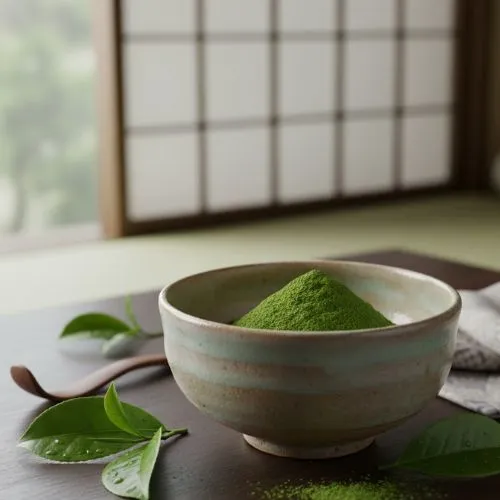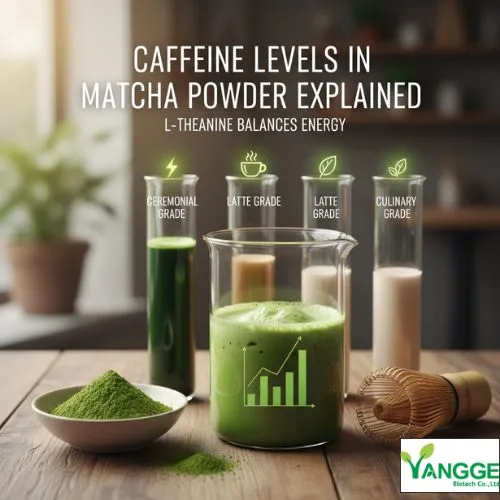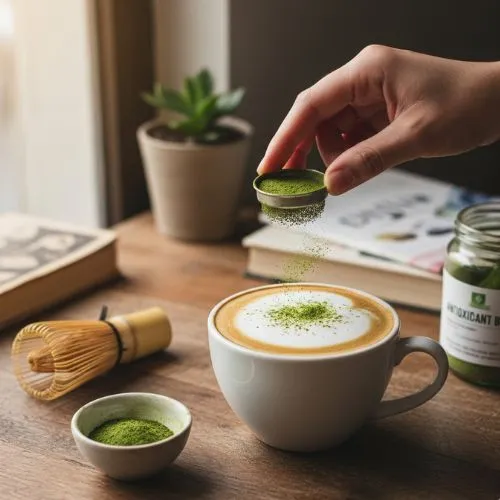Is matcha high in caffeine?
Matcha, the vibrant green powdered tea that has taken the world by storm, is renowned for its unique flavor profile and potential health benefits. However, one question that often arises among matcha enthusiasts and newcomers alike is: "Is matcha high in caffeine?" In this comprehensive guide, we'll delve into the caffeine content of matcha powder, explore its energy-boosting properties, and compare it to other popular caffeinated beverages.

Caffeine Levels in Matcha Powder Explained
Understanding Matcha's Caffeine Content
Matcha powder, derived from shade-grown green tea leaves, does indeed contain caffeine. The caffeine content in matcha can vary depending on several factors, including the quality of the tea leaves, growing conditions, and processing methods. On average, a single serving of matcha (usually about 1-2 grams of powder) contains approximately 25-70 mg of caffeine.
Factors Affecting Caffeine Levels in Matcha
Several elements influence the caffeine content in matcha powder:
- Tea plant variety: Different cultivars of Camellia sinensis can produce varying levels of caffeine.
- Growing conditions: Shade-grown tea leaves, like those used for matcha, tend to have higher caffeine concentrations.
- Harvesting time: Younger tea leaves typically contain more caffeine than mature ones.
- Processing methods: The unique grinding process used to create matcha powder preserves more of the leaf's nutrients, including caffeine.
Comparing Matcha's Caffeine to Other Teas
When compared to other types of tea, matcha generally has a higher caffeine content. This is primarily due to the fact that matcha is made from whole tea leaves ground into a fine powder, whereas traditional teas are steeped and discarded. As a result, matcha drinkers consume the entire leaf, leading to a more concentrated dose of caffeine and other beneficial compounds.

How Matcha Powder Boosts Energy Safely?
The Synergistic Effect of Caffeine and L-Theanine
One of the unique aspects of matcha powder is its balanced combination of caffeine and L-theanine, an amino acid known for its calming properties. This synergistic relationship results in a more sustained and focused energy boost, often described as "calm alertness." Unlike the jittery effects sometimes associated with coffee, matcha provides a smoother, more gradual increase in energy levels.
Antioxidants and Their Role in Energy Production
Matcha is exceptionally rich in antioxidants, particularly catechins like epigallocatechin gallate (EGCG). These powerful compounds not only contribute to matcha's potential health benefits but also play a role in enhancing energy production at the cellular level. By protecting cells from oxidative stress and supporting mitochondrial function, the antioxidants in matcha may help improve overall energy levels and vitality.
Matcha's Impact on Cognitive Function
The combination of caffeine and L-theanine in matcha has been shown to have positive effects on cognitive function. Studies suggest that this unique blend can improve attention, memory, and reaction time. For those seeking a natural way to enhance mental clarity and focus, matcha powder offers a promising solution without the potential downsides of excessive caffeine consumption.
Matcha vs Coffee: Comparing Caffeine Content
Caffeine Levels: A Side-by-Side Comparison
When it comes to caffeine content, matcha and coffee have some notable differences:
- Matcha: 25-70 mg per serving (1-2 grams of powder)
- Brewed coffee: 95-200 mg per 8 oz cup
At first glance, it may appear that coffee contains significantly more caffeine than matcha. However, it's essential to consider the quality of the caffeine boost and the overall effects on the body.
The Quality of the Caffeine Experience
While coffee may provide a more immediate and intense caffeine rush, matcha offers a more balanced and sustained energy boost. This is largely due to the presence of L-theanine, which helps to modulate the effects of caffeine. Many people report feeling more focused and alert after consuming matcha, without the jitters or crash often associated with coffee consumption.
Additional Health Benefits of Matcha
Beyond its caffeine content, matcha powder offers a wide array of potential health benefits that set it apart from coffee:
- Higher antioxidant content
- Potential metabolism-boosting properties
- Support for heart health
- Possible anti-inflammatory effects
These additional benefits make matcha an attractive alternative for those looking to reduce their coffee intake while still maintaining a healthy energy boost.

Conclusion
While matcha does contain caffeine, its unique composition offers a more balanced and sustained energy boost compared to other caffeinated beverages. The synergistic effects of caffeine and L-theanine, combined with matcha's rich antioxidant profile, make it a compelling choice for those seeking a natural energy source. Whether you're looking to reduce your coffee intake or simply explore new ways to enhance your focus and vitality, matcha powder presents an excellent option.
At Yangge Biotech Co., Ltd., we're passionate about providing high-quality matcha powder and other natural plant extracts to meet your dietary and wellness needs. Our ISO, HACCP, Kosher, and Halal certified products are crafted with care to ensure optimal potency and purity. Explore our range of matcha powder options and discover the perfect blend for your lifestyle. As experts in natural plant extracts, Yangge Biotech Co., Ltd. is proud to offer top-quality matcha powder for your food, beverage, and dietary supplement needs. Our matcha powder factory utilizes state-of-the-art technology to ensure the highest standards of purity and potency. Whether you're looking to enhance your product line or explore the benefits of matcha for personal use, our team is here to provide innovative solutions tailored to your requirements. Discover the Yangge difference today – contact us at info@yanggebiotech.com to learn more about our premium matcha powder and other natural extracts.
FAQ
Q: Can we get some samples to test before purchasing?
A: Of course, we can provide free samples of 20 to 100 grams, but the shipping cost is at the customer's expense. The shipping cost can be deducted from the next order, or the samples can be sent through your courier account.
Q: Do your products have relevant certifications?
A: Yes, our products are certified for HALAL, ISO, HACCP, Kosher, and other certifications.
Q: What is the minimum order quantity (MOQ)?
A: Small batches of samples can be customized according to your requirements.
Q: Do you offer OEM and ODM services? Can the formula be customized based on our own?
A: Of course, we provide ODM and OEM services to many customers. Our product range includes softgels, capsules, tablets, sachets, granules, and private label services. Simply contact us and let us know your requirements. Our experienced R&D team can also develop new products with specific formulas.
Please contact us to design your own branded products.
Q: How do you handle quality complaints?
A: First, we have a comprehensive quality control SOP. We provide authoritative third-party inspection reports for almost all products before shipment to minimize the possibility of quality issues. Second, we have a comprehensive return and exchange procedure. If there is a genuine quality dispute, we will strictly follow the SOP.
Q: How do you ship? How long does delivery take?
A: For small orders, we typically use DHL, UPS, EMS, FedEx, or TNT. Delivery typically takes 3-7 days. We also offer air and sea freight services. We have a strong freight forwarding team and can provide you with a one-stop service, including DDP and DDU.
Q: What are your payment terms?
A: 100% prepayment, payable by T/T, Western Union, MoneyGram, or PayPal.
Q: What is the shelf life of your products?
A: 2 years with proper storage.
Q: Is the packaging environmentally friendly?
A: We attach great importance to environmental protection and are constantly improving our product packaging. Some products are packaged in recyclable paper. Packaging materials are carefully selected to ensure product safety during transportation and storage, and to minimize environmental impact. We are committed to achieving a balance between environmental friendliness and practicality in our product packaging, and to contributing to sustainable development.
References
1. Kochman, J., Jakubczyk, K., Antoniewicz, J., Mruk, H., & Janda, K. (2021). Health Benefits and Chemical Composition of Matcha Green Tea: A Review. Molecules, 26(1), 85.
2. Dietz, C., Dekker, M., & Piqueras-Fiszman, B. (2017). An intervention study on the effect of matcha tea, in drink and snack bar formats, on mood and cognitive performance. Food Research International, 99, 72-83.
3. Xu, P., Ying, L., Hong, G., & Wang, Y. (2016). The effects of the aqueous extract and residue of Matcha on the antioxidant status and lipid and glucose levels in mice fed a high-fat diet. Food & Function, 7(1), 294-300.
4. Unno, K., Furushima, D., Hamamoto, S., Iguchi, K., Yamada, H., Morita, A., ... & Nakamura, Y. (2018). Stress-reducing function of matcha green tea in animal experiments and clinical trials. Nutrients, 10(10), 1468.
5. Schramm, L. (2013). Going Green: The Role of the Green Tea Component EGCG in Chemoprevention. Journal of Carcinogenesis & Mutagenesis, 4(6), 1000142.

Based on your location and order quantity, you will have the opportunity to receive a limited time free shipping promotion!

Who we are


